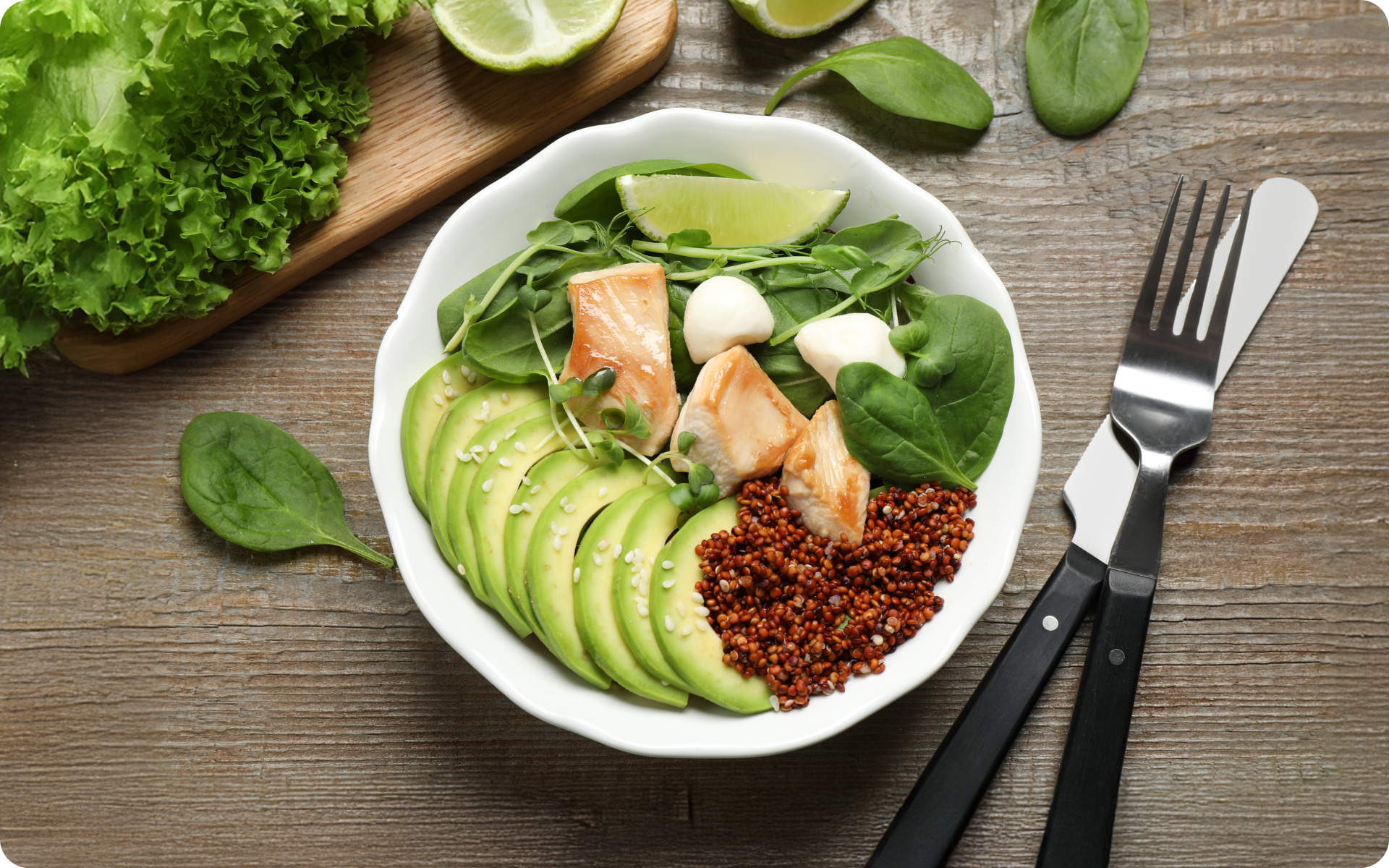Are you frustrated because you’ve been watching your caloric intake, maintaining a calorie deficit, but the scale’s number won’t budge?
Rest assured, you are not alone in this perplexing situation. Many individuals have the same problem, wondering why their efforts aren’t translating into the desired weight loss or progress.
Diet culture frequently represents weight loss as a simple equation: ingest fewer calories than expended, and pounds will melt away.
Nonetheless, many factors can influence weight loss beyond just calorie counting. This article will explore these factors, the complexities of calorie deficits, and why you might not lose weight despite maintaining one.
Is It Possible To Be In A Calorie Deficit And Not Lose Weight?
The short answer is yes. Being in a calorie deficit and not seeing immediate weight loss is possible. While the basic principle of “calories in vs. calories out” has some truth, weight loss is a complex process influenced by various factors beyond calorie intake. Understanding these factors is crucial for anyone embarking on a weight loss journey.
Several factors can contribute to this, including:
- Inaccuracies in calorie tracking
- Metabolic adaptation
- Hormonal changes
- Water retention
- Muscle gain
- Stress
Our body is a complex system that can adjust its energy expenditure to compensate for reduced calorie intake, slowing down the metabolism in the process.
What Are The Reasons Of Not Losing Weight When In A Calorie Deficit?
We will explore some of the common reasons why you might not be experiencing weight loss despite being in a calorie deficit:
- Inaccurate Calorie Tracking:
This is one of the most common errors, typically due to underestimating calorie intake or overestimating calorie burn. To ensure accuracy, using a reliable food scale or measuring utensils and a reputable tracking app to monitor your calorie consumption is helpful (Hand & Gilhooly, 2022).
- Metabolic Adaptation:
Your body can remarkably adapt to lower calorie intake by slowing metabolism. This adaptive response is a survival mechanism that can hinder weight loss progress. For example, reducing your calorie intake may eventually lower your body’s metabolic rate to conserve energy. This adaptation can make it harder to lose weight over time (Müller et al., 2020).
- Water Retention:
Factors such as sodium intake, hormonal changes, and stress can lead to water retention, which can mask fat loss on the scale. It’s important to remember that the scale’s number won’t always reflect weight loss progress (Eberle & Ament, 2020).
- Muscle Gain:
If you’re new to exercise or incorporating strength training into your routine, you might simultaneously gain muscle while losing fat. This muscle gain can change the scale’s number, as muscle is denser than fat (Phillips & Winett, 2019).
If you wish to free yourself from all the extra pounds that have been weighing you down for way too long, start using the BetterMe: Health Coaching app and overhaul your entire life!
- Lack of Sleep:
Poor sleep can disrupt the delicate balance of hormones regulating hunger and metabolism, potentially hindering weight loss. Prioritizing quality sleep is crucial for overall well-being and weight management.
- Stress:
Chronic stress can elevate cortisol levels, a hormone that promotes fat storage, especially around the midsection. Finding effective stress management techniques can positively impact weight loss efforts.
- Hormonal Factors:
Hormones such as cortisol (the stress hormone) and insulin can impact your ability to lose weight. High-stress levels or insulin resistance can hinder weight loss efforts (Chow et al., 2022). Also, certain medical conditions, such as hypothyroidism or polycystic ovary syndrome (PCOS), can make weight loss more challenging. Consult with a healthcare professional if you suspect any underlying health issues.
- Digestive Health:
Gut health plays a significant role in weight management in ways that scientists are only beginning to understand (Lynch & Pedersen, 2019). Additionally, many things that support gut health are also helpful for weight loss, such as eating more fruits, vegetables, and other fiber-rich foods, drinking enough water, moving more, etc.
Read more: Calorie Deficit But Not Losing Weight: What’s The Culprit Behind It?
Why Am I Not Losing Weight On A 1200 Calorie Deficit?
A 1200-calorie diet is restrictive and may not provide enough nutrients for everyone. Additionally, such a low intake can trigger your body’s starvation response, which means that your body perceives the deficit and starts slowing down your metabolism to conserve energy, an adaptive response that might interfere with the weight loss progress.
It’s also possible that you are underestimating your calorie intake, your activity level is lower than expected, or some other factor is at play. Hence, discussing individualized recommendations with a healthcare professional is crucial.
Remember that the number on the scale is just a number, as it does not provide a deep breakdown of the body composition.
We should consider water retention, too, as you might be losing fat but retaining water, which can mask and make it look like there is no weight loss on the scale.
Remember that we can’t only determine weight loss by the number on the scale.
Psychological stress from such a restrictive diet can also lead to increased cortisol levels, which can impede weight loss. A 1200-calorie deficit diet is considered low and may not suit everyone. In some cases, an extremely low-calorie intake can lead to muscle loss instead of fat loss, which can impact overall body composition (Müller et al. 2020).
How Long Does It Take To See Results From A Calorie Deficit?
The timeline for seeing results from a calorie deficit can vary from person to person. However, as a general guideline, you might notice a slight difference on the scale within 1-2 weeks of consistent calorie deficit.
Visible changes often become more apparent after 4-8 weeks of maintaining a calorie deficit. Significant weight loss, typically around 5-10% of your body weight, usually occurs over a period of 3-6 months or more. (Hall & Kahan. 2020).
The timeline for seeing results from a calorie deficit can vary widely based on individual factors like starting weight, age, sex, and activity level. Typically, you might start noticing changes within a few weeks, but significant weight loss usually becomes evident after a couple of months. Being patient and consistent is essential, as healthy and sustainable weight loss is generally slow and steady.
Read more: The Fastest Way to Lose 100 Pounds – A Sustainable Approach
How Do I Know If My Calorie Deficit Is Working?
To determine the effectiveness of your calorie deficit, look out for the following signs:
- Gradual Weight Loss: Your calorie deficit works if you consistently lose weight over time. Be aware of daily fluctuations due to water retention and other factors. Also, weight loss isn’t always linear, and that’s okay.
- Clothes Fitting Looser: As you lose fat and inches, your clothes may start to feel looser and more comfortable.
- Increased Energy Levels: A well-balanced diet with a calorie deficit should provide you with enough energy to carry out your daily activities without feeling excessively fatigued.
- Improved Mood and Sleep Quality: A calorie deficit that is sustainable and nourishing can positively impact your mood and sleep patterns.
- Progress Photos: Taking progress photos at regular intervals can help you visually track changes in your body composition.
- Decreased Body Measurements: Measuring the circumference of various parts of your body, such as waist, hips, and thighs, can provide additional insights into your progress, and if available to you, you can have your body fat percentage measured, which provides a clearer picture of fat loss versus muscle gain (Hall & Kahan, 2020).
Which Body Part Loses Fat First?
Fat reduction transpires across the body in an inconsistent manner, with specific regions exhibiting more prompt changes than others. It is observed that males typically exhibit initial fat loss predominantly in the abdominal region, whereas females generally perceive alterations first in the hip and thigh areas. However, it’s important to note that spot reduction, or targeting fat loss in specific areas, is a myth. Fat loss is a systemic process that occurs throughout the body.
Whether you’re a workout beast or just a beginner making your first foray into the world of fitness and dieting – BetterMe has a lot to offer to both newbies and experts! Install the app and experience the versatility first-hand!
Example of a Calorie Deficit Diet Plan:
To achieve sustainable weight loss, it’s important to follow a calorie deficit diet that is both nutritious and enjoyable. Here’s a sample meal plan to give you an idea:
Calorie-Deficit Meal Plan:
- Start your day with a serving of Greek yogurt topped with fresh berries and a sprinkle of nuts for added crunch and healthy fats.
- Pair it with a slice of whole grain toast topped with mashed avocado and a poached egg for a satisfying and nutrient-rich calorie deficit breakfast.
- Enjoy a grilled chicken salad loaded with mixed vegetables for a generous dose of fiber, vitamins, and lean protein for lunch.
- As a mid-afternoon snack, savor apple slices paired with a dollop of almond butter for a combination of natural sweetness and healthy fats.
- For dinner, opt for a baked salmon filet served with a side of quinoa and roasted broccoli. This meal provides a balance of omega-3 fatty acids, protein, and fiber (Jakubowicz et al., 2019).
A 1500 calorie deficit is generally considered extreme and unsustainable for most individuals. Such a drastic deficit can lead to nutrient deficiencies, muscle loss, and metabolic slowdown. Most dietitians recommend a more moderate calorie deficit of 500-750 calories daily for safe and sustainable weight loss. This approach helps ensure that you’re still receiving adequate nutrients while losing weight at a pace that minimizes negative side effects. It’s also important to tailor your calorie deficit to your needs, considering factors like your age, sex, activity level, and overall health. A healthcare professional or a registered dietitian can provide personalized guidance and help create a balanced plan that promotes steady weight loss without compromising your well-being. To accurately track weight loss, use a combination of methods. Monitor your weight weekly, measure body parts, take progress photos, and notice how your clothes fit. Also, pay attention to energy levels, mood, and body composition changes. Combining these methods provides a more comprehensive understanding of your progress. The act of losing a total weight of 5 kg, which translates to roughly 11 pounds, frequently becomes apparent and noticeable, especially on a smaller frame. However, the visibility of weight loss can vary depending on factors such as your starting weight, height, and how the weight is distributed across your body. Furthermore, this change’s psychological ramifications and dynamic responses can be notably profound. Losing 10 kg (approximately 22 pounds) generally takes about 10 to 20 weeks, assuming a healthy and sustainable weight loss rate of 0.5 to 1 kg per week. This pace supports gradual changes that are more likely to be maintained long-term while helping to preserve muscle mass and reduce the risk of rebound weight gain. However, several factors can influence this timeframe, including your starting weight, age, sex, metabolic rate, and overall lifestyle.Frequently Asked Questions
Is a 1500 calorie deficit too much?
How do I tell if I’m losing weight?
Is losing 5 kg noticeable?
How long does it take to lose 10 kgs?
The Bottom Line
Understanding the intricacies of calorie deficits and weight loss can help you navigate potential obstacles and set realistic expectations. Remember that weight loss is not a linear process and that factors such as metabolic adaptation, hormonal changes, and lifestyle can all influence your progress. Stay patient, be consistent, and focus on overall health and well-being rather than just the number on the scale. With the right approach, you can achieve your weight loss goals in a healthy and sustainable manner.
DISCLAIMER:
This article is intended for general informational purposes only and does not serve to address individual circumstances. It is not a substitute for professional advice or help and should not be relied on for making any kind of decision-making. Any action taken as a direct or indirect result of the information in this article is entirely at your own risk and is your sole responsibility.
BetterMe, its content staff, and its medical advisors accept no responsibility for inaccuracies, errors, misstatements, inconsistencies, or omissions and specifically disclaim any liability, loss or risk, personal, professional or otherwise, which may be incurred as a consequence, directly or indirectly, of the use and/or application of any content.
You should always seek the advice of your physician or other qualified health provider with any questions you may have regarding a medical condition or your specific situation. Never disregard professional medical advice or delay seeking it because of BetterMe content. If you suspect or think you may have a medical emergency, call your doctor.
SOURCES:
- Müller, M. J., Enderle, J., & Bosy-Westphal, A. (2020). Changes in Energy Expenditure with Weight Gain and Weight Loss in Humans. Current Obesity Reports, 9(4), 413-423.
- Krupa, M., Blanchard, C et al. Perspective: Opportunities and Challenges of Technology Tools in Dietary and Activity Assessment
- Wong, J. M. W., Yu, S., Ma, C., Mehta, T., Dickinson, S. L., Allison, D. B., Heymsfield, S. B., Ebbeling, C. B., & Ludwig, D. S. (2022). Stimulated insulin secretion predicts changes in body composition following weight loss in adults with high BMI
- Levine, G. N., Cohen, B. E., Commodore-Mensah, Y., & Fleury, J. (2020). Psychological health, well-being, and the mind-heart-body connection
- Phillips, S. M., & Winett, R. A. (2019). Uncomplicated Resistance Training and Health-Related Outcomes: Evidence for a Public Health Mandate. Current Sports Medicine Reports, 18(12), 490-496.
- Lynch, S. V., & Pedersen, O. (2019). The human intestinal microbiome in health and disease. New England Journal of Medicine, 380(23), 2320-2332.
- Hall, K. D., & Kahan, S. (2020). Maintenance of lost weight and long-term management of obesity. Medical Clinics of North America, 104(1), 183-197.
- Jakubowicz, D., Wainstein, J., Ahrén, B., Barnea, M., Landau, Z., & Rabinovitz, H. R. (2019). High-energy breakfast with low-energy dinner decreases overall daily appetite and improves glycemic control among obese and type 2 diabetic patients. Cell Metabolism, 29(1), 110-119.










